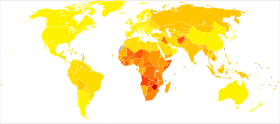Disability-adjusted life year
Disability-adjusted life years (DALYs) are a way of measuring the effects of diseases. They are calculated as the number of years lost due to ill-health, disability, or early death. The measure was developed in the 1990s as a way of comparing the overall health and life expectancy of different countries.

DALYs are used in the field of public health and health impact assessment . They include the potential years of life lost due to premature death and years of 'healthy' life lost by virtue of being in states of poor health or disability. In so doing, mortality and morbidity are combined into a single figure.[2]
Calculation
changeDisability-adjusted life years are related to the quality-adjusted life year (QALY) measure; however, QALYs only measure the benefit with and without medical intervention and therefore do not measure the total burden. Also, QALYs tend to be an individual measure and not a measure of the whole population.
The most appropriate measure of the effects of chronic illness is time, both time lost due to premature death and time spent disabled by disease. One DALY, therefore, is equal to one year of healthy life lost.
How much a medical condition affects a person is called the disability weight (DW). This is determined by disease or disability and does not vary with age. Tables have been created of thousands of diseases and disabilities, ranging from Alzheimer's disease to loss of finger, with the disability weight meant to indicate the level of disability that results from the specific condition.
| Condition | DW 2004 | DW 2010[3] |
|---|---|---|
| Alzheimer's and other dementias | 0.666 | 0.666 |
| Blindness | 0.594 | 0.195 |
| Schizophrenia | 0.528 | 0.576 |
| AIDS | 0.505 | 0.547 |
| Burns 20%–60% of body | 0.441 | 0.438 |
| Fractured femur | 0.372 | 0.308 |
| Moderate depression episode | 0.350 | 0.406 |
| Amputation of foot | 0.300 | 0.021–0.1674 |
| Deafness | 0.229 | 0.167–0.281 |
| Infertility | 0.180 | 0.026–0.056 |
| Amputation of finger | 0.102 | 0.030 |
| Lower back pain | 0.061 | 0.0322–0.0374 |
Examples of the disability weight are shown. Some of these are "short term", and the long-term weights may be different.
References
change- ↑ "Disease and injury country estimates". World Health Organization. Archived from the original on 2009-11-11. Retrieved Nov 11, 2009.
- ↑ "Metrics: Disability-Adjusted Life Year (DALY)". WHO. Archived from the original on Feb 20, 2020. Retrieved 2020-01-02.
- ↑ WHO 2013.